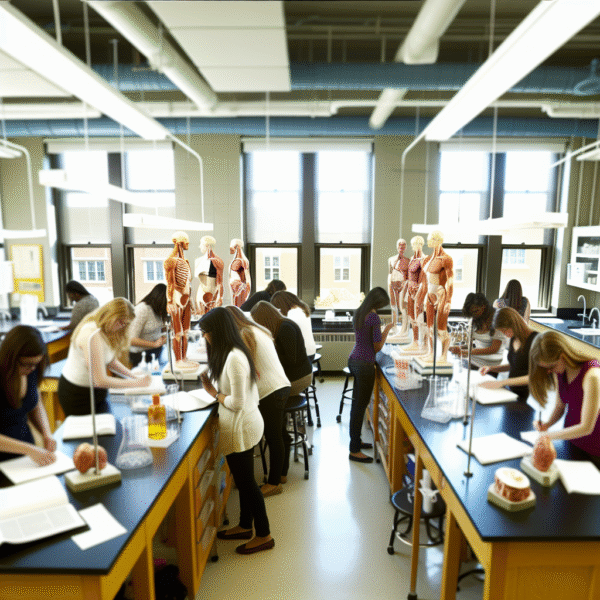Students who decide to study nursing can often feel overwhelmed by the many paths available. There are so many different degrees, certifications, and professional titles that the nursing world can seem like a confusing maze. For those that choose to begin the journey to become a registered nurse (RN), the course information of many RN programs is a great way to begin to decide what program is right for you. Let’s explore what you learn in RN programs and see which type of nursing school is right for you.
Before you begin, it is important to understand that nursing school is a challenging, yet rewarding journey. Students who decide to become RNs should understand the time, money, and effort that must be spent to become a successful RN. In many RN programs, half of the course is spent learning the technical side of nursing, like heart rhythms or patient care, and the rest is spent applying the learned principles to professional environments. A degree in nursing requires students to become skilled at the mental, emotional, and physical concepts that will provide patients with the best possible care.
Nursing School Program Variations
Prospective students can become a licensed practical nurse (LPN), a registered nurse (RN), or an advanced practice nurse (APN).Depending on the program students pursue, varying degrees of skills, procedures, and knowledge will be required. The programs may require practice in settings like technical learning centers, hospitals, or other medical facilities. Each state in America has its own nursing board that decides what training must be provided in accredited nursing programs; as a result, licensure is only valid in the state where it is issued.
Common RN Program Courses
Whether the student enrolls in a program for a Bachelor’s of Science in Nursing, an Associate’s Degree in Nursing, or a 3 year hospital training diploma, the courses and information experienced will follow a similar outline. Students may have the option of taking courses in communication and critical thinking skills, pathophysiology, algebra, anatomy and physiology, nursing fundamentals, nursing process, physical assessment, medical surgical nursing, maternal newborn nursing, pediatric nursing, foundations of fundamental health nursing, current issues in nursing, advanced medical surgical nursing, basic nutrition, pharmacology, psychology, or sociology.
Some of the courses require lab and clinical practice hours in addition the regular lecture hours. In many cases, ADN programs are available at local community colleges and require around 115-130 hours, taking about 2 years to complete. When selecting a school that offers an ADN program, make sure the school’s accreditation is recognized by the U.S. Department of Education to ensure your degree is recognized by future employers. In addition, if you ever decide to continue your education, accredited school credits often transfer to other programs.
Bachelor programs generally take 4 years, although many hospitals and professional medical facilities require registered nurses to have at least a BSN. While the program is more time intensive and expensive, students will have more opportunities in management and hospital positions. Students who have an Associate’s degree are still likely to find job opportunities in private medical practices, nursing homes, and hospitals in rural areas. Furthermore, after students have earned an Associate’s Degree, many schools have bridge programs that allow students to continue their education to earn a Bachelor’s. Associate programs are excellent for students looking to gain experience in the nursing field before committing to 4 years of expenses and intensive work.
What You Learn in RN Programs
RN programs, whether ADN or BSN, prepare students for nursing careers through comprehensive training. They cover essential subjects to develop skills for safe, effective patient care. Key areas include:
Anatomy and Physiology:
Students learn about the structure and function of the human body, including organs, systems, and physiological processes. This knowledge forms the foundation for understanding disease processes, medication actions, and the body’s response to health and illness.
Nursing Fundamentals:
This course introduces students to the fundamental principles and skills of nursing practice. It covers topics such as the nursing process, patient assessment, vital sign measurement, medication administration, infection control, and basic nursing procedures like wound care and patient hygiene.
Pharmacology:
Students gain an understanding of medications, including their classifications, mechanisms of action, therapeutic uses, side effects, and nursing considerations for safe administration. Pharmacology education is crucial for nurses to ensure medication safety and provide optimal patient care.
Medical-Surgical Nursing:
This course focuses on the care of adult patients with various medical conditions. Students learn about common diseases, diagnostic procedures, treatments, and nursing interventions specific to medical-surgical care. Topics may include respiratory, cardiovascular, gastrointestinal, endocrine, renal, and neurological systems.
Obstetric and Pediatric Nursing:
Students are introduced to the care of women during pregnancy, childbirth, and postpartum periods, as well as newborn care. They learn about prenatal development, labor and delivery, complications of pregnancy, and maternal and infant health promotion. Pediatric nursing covers the care of infants, children, and adolescents, including growth and development, common childhood illnesses, and family-centered care.
Mental Health Nursing:
This course focuses on the assessment, treatment, and support of individuals with mental health disorders. Students learn about mental health assessment, therapeutic communication, psychopharmacology, and interventions for patients experiencing psychiatric crises or chronic mental health conditions.
Nursing Ethics and Legal Issues:
Students explore the ethical and legal dimensions of nursing practice. They learn about professional standards, ethical decision-making, patient rights, confidentiality, informed consent, and legal responsibilities related to nursing care.
Nursing Research and Evidence-Based Practice:
This course introduces students to the basics of nursing research, evidence-based practice, and the use of research findings to guide clinical decision-making. Students learn how to critically appraise research studies, apply evidence-based guidelines, and contribute to the advancement of nursing knowledge.
Leadership and Management:
This course prepares students for leadership and management roles in nursing. It covers topics such as healthcare organization and delivery systems, leadership styles, delegation, teamwork, quality improvement, and patient safety.
Clinical Practicum:
In addition to classroom learning, RN programs include clinical practicum experiences in various healthcare settings. These practicums allow students to apply theoretical knowledge, develop clinical skills, and gain hands-on experience in providing patient care under the supervision of a registered nurse.
RN program curricula vary, with BSN programs offering a more comprehensive education, including community health, research, and leadership. Both ADN and BSN programs provide the foundation for a nursing career.
As RN job opportunities grow, so do online RN programs. Nursing students should consider their goals and choose the right program. Bachelor’s graduates are in high demand, but an Associate’s Degree is a great way to explore nursing before a bigger commitment.




